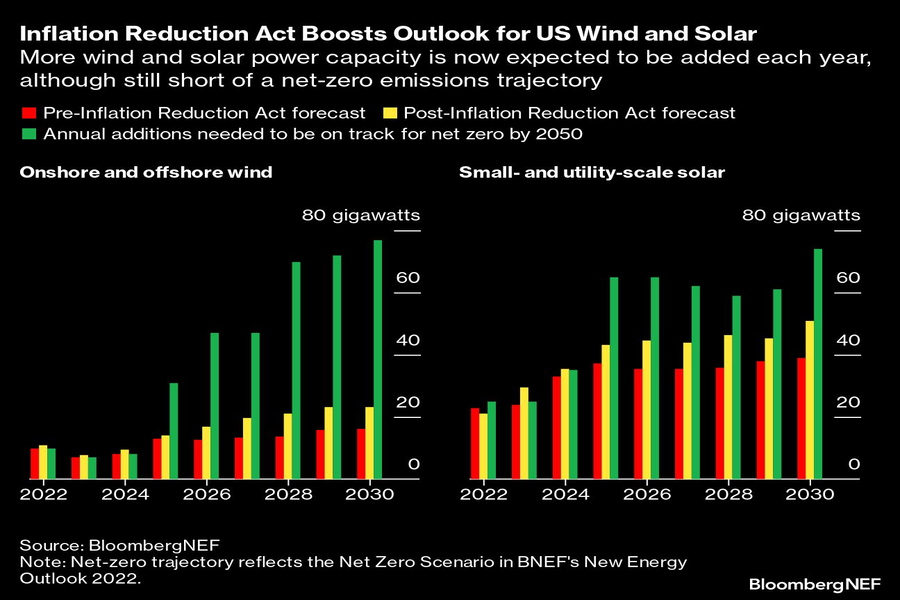

Impax Asset Management Group, which runs one of the world’s biggest investment portfolios geared toward a low-carbon economy, is warning that even after the latest wave of subsidies and incentives, there just aren’t enough places to allocate green capital.
Governments still have a lot more levers to pull before policies are powerful enough to address the upheaval that climate change is causing, according to Ian Simm, the 56-year-old chief executive and founder of Impax.
“From our vantage point, what’s holding this back isn’t the lack of private capital but a dearth of investible projects,” Simm, who’s based in London, said in an interview. Investors like Impax, which oversees about $50 billion in client assets, would “move more swiftly if there were more projects” to which to dedicate funds, he said.
The entreaty comes roughly a week after a milestone assessment by climate scientists of the planet’s current trajectory. The Intergovernmental Panel on Climate Change says public and private climate financing would have to increase as much as six-fold by the end of this decade to prevent the average temperature increase from exceeding the critical threshold of 1.5C.
“There’s a disconnect that needs to be bridged,” Simm said.
Impax’s vast portfolio is already crammed with stocks targeting environmental and social goals, spanning businesses in everything from renewable energy to water protection and the reduction of food waste. The asset manager, which has been reviewing its options in order to take full advantage of climate subsidies offered through the U.S. Inflation Reduction Act, says the IPCC’s latest forecast underlines the urgency of its strategy.
Without more green investments, the likelihood of avoiding the worst impacts of climate change becomes increasingly remote, according to the IPCC. Its dire predictions have gotten the attention of a number of high-profile asset managers, who are urging their peers to pay attention.
“It’s incumbent on investors to seriously digest the message from the IPCC report,” said Adam Matthews, chief responsible investment officer for the Church of England Pensions Board. “What else do we need to be told in terms of urgency?”
Companies are likely to use the IPCC data to assess the potential climate impacts on their supply chains. Banks can apply the findings to estimate risks facing their loan books. For asset managers, the data offers a guide in how to allocate capital to decarbonize portfolios.
The Biden administration’s climate bill indicates about $370 billion in green subsidies. But the IRA doesn’t stipulate a limit, and BloombergNEF has noted that the figure is in principle uncapped. Analysts at Goldman Sachs Group Inc. recently estimated that the bill will probably result in roughly $1.2 trillion of funds to spur private-sector investments.
The IPCC report is designed to spur policymakers to step up their support of green initiatives. In Europe, lawmakers are doing everything they can to match the Biden administration’s climate bill resulting in the bloc’s Green Deal Industrial Plan, among other measures. Critics warn European efforts are marred by excess bureaucracy, but agree that there’s currently a race to the top in Europe and the U.S. that has the potential to turbo-charge the green agenda.

The IPCC report also calls on countries to adopt a new 60% greenhouse gas emissions-reduction target for 2035, while previous emissions goals focused on the end of decades: 2030, 2040 and 2050. That approach could potentially be embraced by investors as well.
On Monday, a coalition of 93 asset managers including Legal & General Investment Management, BNP Paribas Asset Management, Pictet Group and Schroders Plc called on companies from Ferrari NV to Tesco Plc to move beyond simply setting long-term net-zero commitments to detailing how they plan to deliver on their pledges. The plans must include short- and medium-term emissions-reductions goals and provide details about how their capital expenditures will be used to support such efforts, the investor group said.
“A lot needs to change,” said Ingrid Kukuljan, head of impact and sustainable investing at Federated Hermes.
“For instance, 2050 targets should include interim targets with clear milestones on how they’re going to get there,” she said.
Ultimately, the enactment of historic climate policies on both sides of the Atlantic, as well as an ever-greater sense of urgency around addressing climate change underpins the sense of chasing green investments, Simm said.
“It does give confidence about our policy, he said.

Relationships are key to our business but advisors are often slow to engage in specific activities designed to foster them.

Whichever path you go down, act now while you're still in control.

Pro-bitcoin professionals, however, say the cryptocurrency has ushered in change.

“LPL has evolved significantly over the last decade and still wants to scale up,” says one industry executive.

Survey findings from the Nationwide Retirement Institute offers pearls of planning wisdom from 60- to 65-year-olds, as well as insights into concerns.
Streamline your outreach with Aidentified's AI-driven solutions
This season’s market volatility: Positioning for rate relief, income growth and the AI rebound
